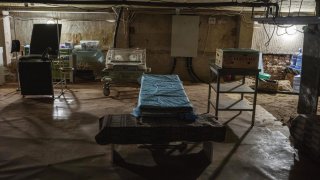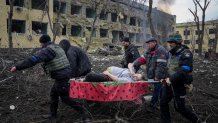
It's easy to tell the delivery room from the rest of the main maternity hospital in Ukraine’s western city of Lviv, even from the outside. Its exterior wall is piled high with sandbags.
In the dim basement, where heavily pregnant women must bend low to avoid the water pipes, there is a delivery table in case the baby comes amid the air raid sirens.
Stress is part of childbirth, but it’s not meant to be like this.
At least 49 attacks have targeted medical facilities in Ukraine since the Feb. 24 Russian invasion, including a maternity hospital bombed in March in Mariupol, where Associated Press images of a wounded pregnant woman being rushed from the rubble on a stretcher were seen around the world, personifying the horror of the attack on civilians. The woman and her baby later died.
Get top local stories in Southern California delivered to you every morning. >Sign up for NBC LA's News Headlines newsletter.

About 200 pregnant women displaced by Russia's invasion have come to the hospital in Lviv since the war began. More than 100 have given birth, said Maria Malachynska, director of the Lviv state regional perinatal center. They come from some of the communities the world now knows by name: Mariupol, Kharkiv, Donetsk, Kyiv.
“This stress which women have, in times of war, it influences a lot and we see a lot of complications,” Malachynska said.
U.S. & World
News from around the country and around the globe
Lilia Myronovich, who heads the natal department at another hospital, Lviv municipal maternity, said she also has seen more premature births than normal. “The women are stressed,” she said. “Especially ladies who come from other districts.”
One woman from Mariupol at the Lviv state perinatal center cries all the time, traumatized after making it out of the besieged city. “They were starving,” Malachynska said. “We are even helping them with clothes, with prams, because they don’t have anything to give to their children.”
Outside the director’s window, a new shelter was being dug. It will be large enough to hold the incubators needed for babies born prematurely.
Upstairs, expectant mother Kateryna Galmalova fled Mykolaiv, a city now occupied by Russian forces, with her husband as tanks were approaching and after three nights sleeping in the hallway amid explosions.
“I had high blood pressure the first few days from this news" of the war, she said. “Because you don’t understand what to do next, where to go, where and how to give birth.”
She fled Mykolaiv with just her documents, spare underwear and the clothes she wore. She was overwhelmed by the kindness she found in Lviv, where she has no family, she said, and which quickly became a haven for hundreds of thousands of people displaced from more threatened parts of Ukraine.
Suddenly a siren sounded, sending patients and staff to the basement until the alert was lifted half an hour later.
“I do not want children to be born in war,” Galmalova said as she waited underground, scrolling through social media on her phone, where she learned of a woman forced to give birth in a bunker. “And I don’t want to give birth in a basement or a bunker. I do not want any child to be born in such a place.”
Another expectant mother, Yana Tananakina, fled from the capital, Kyiv, and wants to return. “Life goes on,” said her husband, Oleksander. “Every war ends. And this one will end, too.” He was so pleasantly surprised by the Lviv maternity hospital that the couple is now considering having their next child there, too.
In a bright and quiet room, Natalya Suhotsha beamed at her newborn twins, Zlata and Sophia. She fled Hostomel, on the outskirts of Kyiv, in the early days of the war when the Russians began to bombard a nearby airport. Her husband gave her five minutes to gather things and go.
She grabbed the baby clothes and little else before escaping to Lviv, where she was born and where her family has a home.
Now, looking at her baby girls makes her forget about the war. She wishes the same happy distraction for every woman.
"We just talk about pretty babies,” the 24-year-old said of her conversations with other displaced new mothers at the hospital. “We don’t talk about the war. Every time you talk about the war, you stress.”
Her mother, a nurse, had promised to be there for the twins' birth. But she remained in Hostomel as the others fled. Natalya said she hopes to return to her mother soon. Her work in real estate is also waiting.
“My work was about the future,” she said. “It was for new families. And it’s all crushed.”
Now it's time to rebuild, she said.
Click here for complete coverage of the crisis in Ukraine.
Associated Press photojournalist Nariman El-Mofty contributed to this report.



